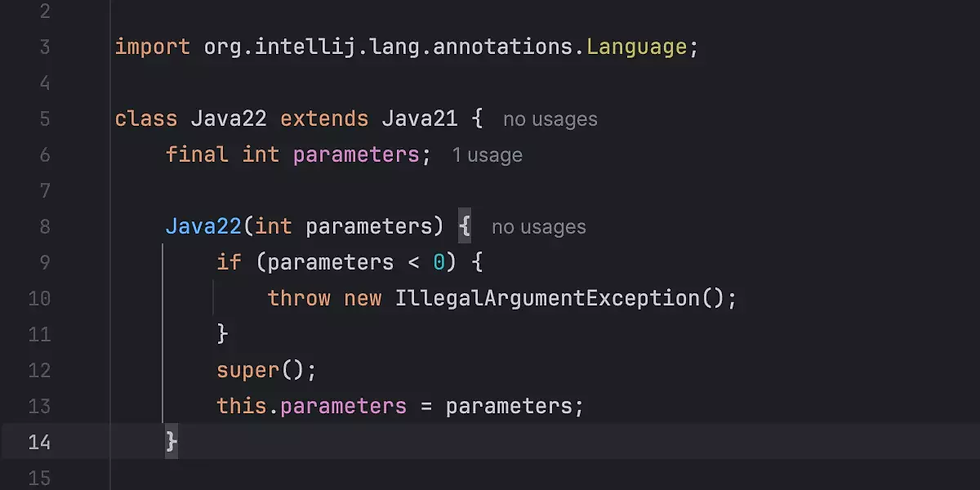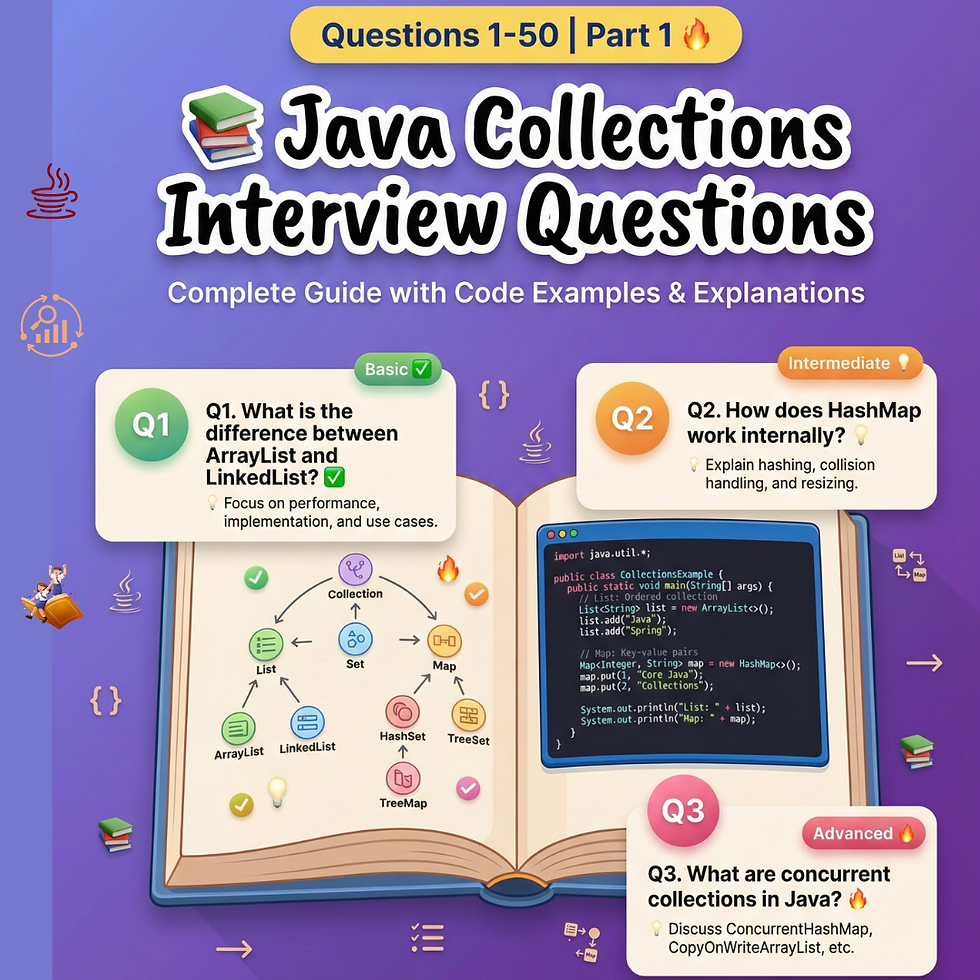Unraveling the Ultimate Java Interview Preparation: Mastering Microservices and Spring Boot Interview Questions for Tech Learners 🔍🌟
- Sahadev Bite
- Oct 16, 2024
- 4 min read
Kickstarting Your Tech Journey
Starting your tech career can be both exciting and daunting. For those aspiring to become proficient in Java programming, Microservices, and Spring Boot, having a structured approach to interview preparation is essential. This blog post will provide you with key strategies and insights to navigate the Java interview landscape effectively. By focusing on high-impact topics and practical examples, you will enhance your knowledge and boost your confidence for interviews ahead.
A Closer Look at Java Development
Before tackling specific interview questions, it’s essential to grasp where Java and Spring Boot fit into the tech ecosystem. Java remains a top choice for enterprise applications. In fact, according to the TIOBE index, Java consistently ranks among the top three programming languages worldwide. Spring Boot further enhances Java’s capabilities by enabling developers to create robust and scalable applications efficiently.
As you prepare, strengthen your foundational knowledge in Java concepts such as:
Object-Oriented Programming (OOP): Know the four pillars—encapsulation, inheritance, polymorphism, and abstraction. For instance, a common question might involve explaining how abstraction improves software design.
Concurrency: Familiarize yourself with Java's concurrency mechanisms. Candidates who can implement a thread-safe singleton pattern stand out.
Error Handling: Understand checked vs. unchecked exceptions and how to use try-catch blocks effectively.
Microservices: Essential Insights
As more companies transition to Microservices architecture, understanding its principles can greatly enhance your interview prospects. Here are some key components to review:
Core Concepts of Microservices
Service Independence: Each Microservice should work alone; when one service gets updated, the others remain unaffected. For example, Netflix employs this principle, allowing teams to deploy updates independently.
Decentralized Database Management: Each service manages its own database. This ensures data integrity and avoids bottlenecks, which is crucial for services like e-commerce platforms that handle high traffic.
Service Discovery: Understanding tools like Spring Cloud Netflix Eureka allows seamless communication between services. Over 60% of organizations report that service discovery improves system scalability.
API Gateway: Implementing an API gateway is essential for routing requests and handling security aspects. It acts as a single entry point that can aggregate responses from multiple services.
Resilience and Fault Tolerance: Applying patterns such as Circuit Breaker and Bulkhead can ensure your application remains operational even under load. Research indicates that implementing these patterns can reduce system downtime by up to 30%.
Common Microservices Interview Questions
What are the advantages of Microservices compared to a monolithic architecture?
How would you ensure effective inter-service communication? Which protocols do you prefer?
Can you elaborate on the Circuit Breaker pattern and its benefits?
What strategies would you use to maintain data consistency across Microservices?
By preparing answers to these questions, you showcase not only your knowledge but also your ability to apply this knowledge in real-world scenarios.
Excelling in Spring Boot
Spring Boot significantly streamlines Java application development. For prospective developers, being prepared for common Spring Boot questions is crucial. Here's what to focus on:
Key Topics for Spring Boot Mastery
Dependency Injection: Understand how Spring Boot uses Inversion of Control to manage dependencies with annotations like `@Autowired` and `@Component`.
Application Properties Management: Learn how to efficiently manage configuration for various environments. Properly structuring properties can lead to enhanced security and performance.
Creating RESTful Web Services: Review how to craft REST APIs using annotations such as `@RestController` and `@RequestMapping`. Be prepared to discuss REST principles like statelessness and client-server architecture.
Unit Testing: Familiarize yourself with JUnit and Mockito for effective testing. The ability to write robust test cases is a valuable skill that often comes up during interviews.
Spring Security: Understand the basics of securing REST APIs, including authentication mechanisms like OAuth2 or JWT. Recent provisions indicate that proper API security practices can reduce breaches by over 40%.
Common Spring Boot Interview Questions
Why are Spring Boot starters helpful for developers?
Describe the steps you would take to secure a REST API using Spring Security.
How can you handle exceptions globally in a Spring Boot application?
What are Spring Boot Actuators, and why are they beneficial for monitoring?
Thoroughly preparing for these questions equips you with both theoretical and practical knowledge vital for success in interviews.
Actionable Strategies for Interview Readiness
Enhancing your prospects isn’t just about studying concepts; here are effective strategies to ensure you're interview-ready:
Hands-On Coding Practice: Actively engage in coding challenges that reflect real-world problems. Platforms like LeetCode have thousands of coding questions, with over 80% focusing on data structures and algorithms, which are often emphasized in interviews.
Mock Interviews: Conduct mock interviews with friends or mentors. This practice can reduce anxiety while allowing you to refine your responses. Furthermore, studies show that candidates who partake in mock interviews feel 50% more prepared on interview day.
Analyze Real-World Use Cases: Study successful implementations of Microservices and Spring Boot. Understanding practical examples can reinforce your theoretical insights and provide discussion points during interviews.
Collaborative Learning: Join study groups or online forums. Engaging with others enriches your learning experience through shared insights and resources.
Stay Updated: Technology is fast-paced. Regularly review the latest trends and tools in Java and Spring Boot to remain competitive.
Keys to Your Success in Java Interviews
Preparing with a focused strategy empowers you to enter your interviews with confidence and competence. Whether you are just stepping into the field or looking to sharpen your skills, a plethora of resources is available to guide you.
Grasping core concepts, preparing for commonly asked questions, and consistently practicing will set you apart in a crowded job market. Mastering these elements requires not only knowledge but also the ability to engage thoughtfully in discussions, handle coding tests, and demonstrate an understanding of complex systems.
While the journey may seem challenging, stay dedicated, and success will come. Good luck on your Java interview preparation journey!






























Comments